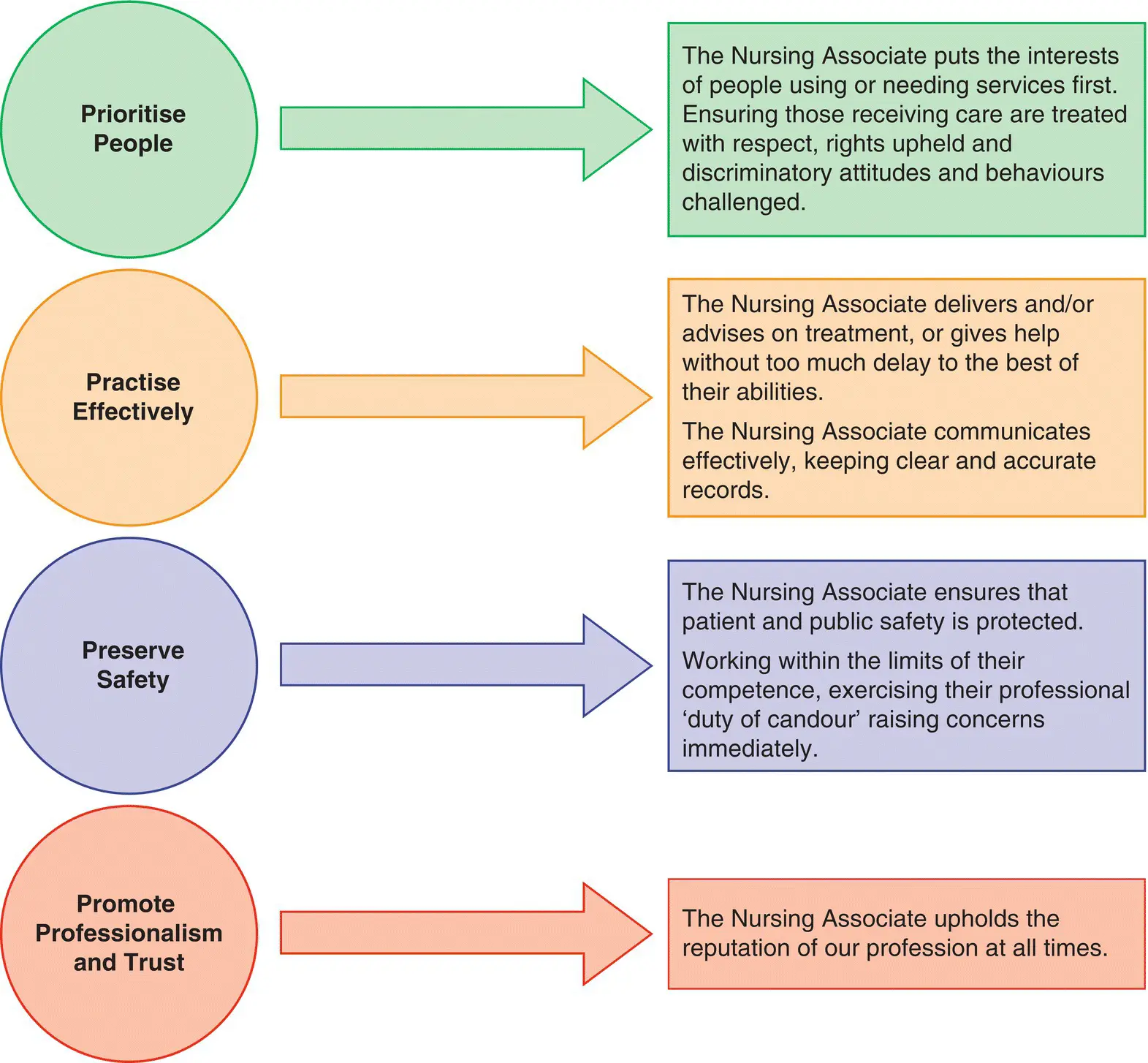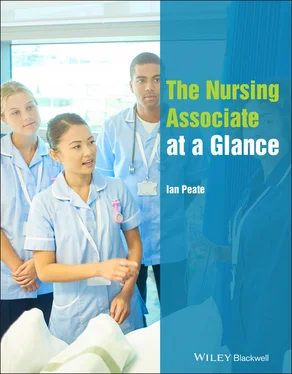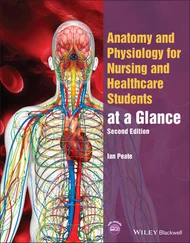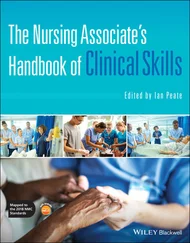The aim of the Nursing Associate programme should be that on completion of their programme the Trainee Nursing Associate will demonstrate passion and confidence in their practice, committed to supporting the holistic delivery of person‐centred care across the life span, embracing the notion of lifelong learning and taking on responsibility for working within their scope of practice.
The six platforms used by the NMC in the Standards of Proficiency for Nursing Associates (NMC, 2018a) have been used to structure the text. Annexes A and B are provided as appendices.
The Nursing Associate at a Glance provides the Trainee Nursing Associate with a revision aid that will support their classroom and practice‐based learning. The text aims to help develop Nursing Associates who are competent, confident and compassionate, providing high‐quality, evidence‐based, holistic, non‐judgemental person‐centred care.
The words that are used to describe people are important. The importance of the terms chosen is that they have the potential to create a particular perception of a person that could be positive, encouraging, enriching or destructive and stigmatising.
Alternatives to the term ‘patient’ like ‘clients’, ‘service users’ and ‘consumers’ have arisen as a consequence of attempts to empower patients by transforming their relationships with illness, society and health and social care professions. Where ‘patients’ is used in this text, this also means those people who are in your care and would include service users. In contemporary health and social care, patients are justifiably seen as experts who have valuable lessons to teach practitioners. It should be noted that any form of labelling will always have the potential to do harm.
1 Health Education England (HEE) (2015). Shape of caring: Raising the bar. https://www.hee.nhs.uk/sites/default/files/documents/2348‐Shape‐of‐caring‐review‐FINAL.pdf. Last accessed August 2020.
2 Health Education England (HEE) (2017). Nursing Associate Curriculum Framework. https://www.hee.nhs.uk/sites/default/files/documents/Nursing%20Associate%20Curriculum%20Framework%20Feb2017_0.pdf. Last accessed August 2020.
3 NHS (2014). Five Year Forward Plan. https://www.england.nhs.uk/wp‐content/uploads/2014/10/5yfv‐web.pdf. Last accessed August 2020.
4 Nursing and Midwifery Council (NMC) (2018a). Standards of proficiency for nursing associates. https://www.nmc.org.uk/standards/standards‐for‐nursing‐associates/standards‐of‐proficiency‐for‐nursing‐associates/Last accessed August 2020.
5 Nursing and Midwifery Council (NMC) (2018b). Standards for pre‐registration nursing associate programmes. https://www.nmc.org.uk/standards/standards‐for‐nursing‐associates/standards‐for‐pre‐registration‐nursing‐associate‐programmes/Last accessed August 2020.
6 Nursing and Midwifery Council (NMC) (2018c). The Code. Professional standards of practice and behaviour for nurses, midwives and nursing associates. https://www.nmc.org.uk/globalassets/sitedocuments/nmc‐publications/nmc‐code.pdf. Last accessed August 2020.
7 Skills for Health (2017). Nursing Associate Apprenticeship Standards. https://haso.skillsforhealth.org.uk/wp‐content/uploads/2017/04/2018.01.12‐L5‐Nursing‐Associate‐ST0508‐Standard.pdf. Last accessed August 2020.
I would like to thank my partner, Jussi Lahtinen, for his support and encouragement.
I am grateful to all of the Trainee Nursing Associates and Nursing Associates who inspire and motivate me.

Platform 1
Being an accountable practitioner
Chapters
1 The Code
2 Legal and ethical
3 Duty of Candour
4 Non-discriminatory behaviour
5 The demands of professional practice
6 Health and well-being: self-care
7 The principles of research and evidence-based practice
8 Emotional intelligence
9 Effective communication
10 Maintaining appropriate relationships
11 Advocacy and person-centred sensitive care
12 Reporting adverse incidents
13 Numeracy, literacy, digital and technological skills
14 Record keeping
15 Reflective practice
16 Promoting public confidence in the profession
At the point of registration, the Nursing Associate will be able to:understand and act in accordance with the Code – professional standards of practice and behaviour for nurses, midwives and Nursing Associates – and fulfil all registration requirements.

Figure 1.1 The Code.
The standards within the Code are what the Nursing Associate commits to when joining or renewing their registration with the Nursing and Midwifery Council (NMC). The professional standards of practice and behaviour are fundamental to being a part of the nursing profession.
The Nursing and Midwifery Council (NMC) functions so as to protect the public. They do this is in a number of ways, for example, by ensuring that only those who meet their requirements are permitted to practise as a nurse or midwife in the UK, or in England, as a Nursing Associate. The NMC will take action if there are any concerns raised about whether a Nursing Associate is fit to practise. In serious cases, this action can lead to the Nursing Associate’s name being removed from the professional register.
The NMC (2018) publishes its Code of Conduct (The Code. Professional Standards of Practice and Behaviours for Nurses, Midwives and Nursing Associates) setting out common standards of conduct and behaviour for those on the register. This aim of the Code is to provide a clear, consistent and positive message to others including patients, service users and colleagues about what it is that they can expect from the Nursing Associate who provides nursing care. The Code describes the professional standards that Nursing Associates must uphold.
Nursing Associates must act in line with the Code, irrespective of whether they are providing direct care to individual people, groups or communities or they are drawing on their professional knowledge to influence nursing practice in other roles, for example, leadership, education or research. The values and principles in the Code are relevant in a range of practice settings; they are not, however, negotiable or optional.
There are four key themes in the Code (see Figure 1.1). The Code applies to all Nursing Associates regardless of where they are practising, for example, in primary care, community, acute care, with adults, older people, children and young people or in places of detention. The Code is generic in nature in so far as it not applicable to any one specific field of nursing, it pertains to learning disabilities nursing, children and young people’s nursing, mental health nursing and adult nursing and across the lifespan. The Nursing Associate may also be working in a social care setting, criminal justice setting, with the homeless, working with families and other agencies; regardless, the Code applies.
At all times the Nursing Associate is required to ensure that the interests of people using or needing nursing services will come first. The care and safety of people are the Nursing Associate’s key concerns; dignity is to be preserved, and needs are to be acknowledged, assessed and responded to. Those who receive care are to be treated with respect, their rights upheld and discriminatory attitudes and behaviours challenged.
Читать дальше














